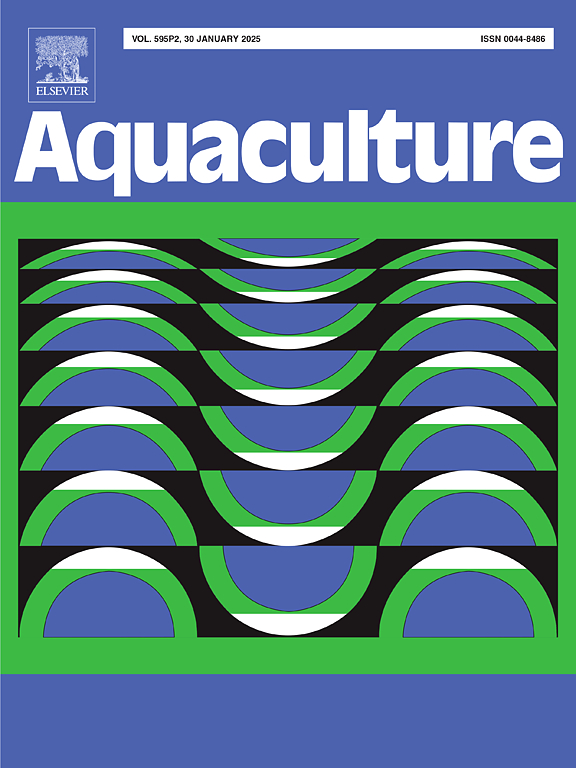微藻衍生饲料添加剂可改善以植物为基础饲料喂养的黄颡鱼幼鱼(Sparus aurata)的生理健康、肠道完整性和福利
IF 3.9
1区 农林科学
Q1 FISHERIES
引用次数: 0
摘要
含有对生物体有益成分的健康水产养殖饲料是一种新兴的选择。在此框架下,饲料添加剂发挥了至关重要的作用,为动物的健康和生理状态提供了许多优势。本研究旨在评估将两种微藻添加剂(LB-IMMUNOboost和LB-LIVERprotect,来自LifeBioencapsulation, Almería,西班牙)掺入仅含5%鱼粉(FM)和5%低鱼油(FO, 5%)的功能饲料中,对食肉鱼类金头海鲷(Sparus aurata)生长和生理健康的影响。试验4种试验饲粮,试验期90 d: 1)采用模仿该物种商业饲粮的配方(C+: 20%鱼粉,9%鱼油);ii)以植物性成分为主的5% FM和5% FO (C -)的日粮;C -饲粮中添加1% LB-IMMUNOboost (IB)或1% LB-LIVERprotect (LP)。结果表明,饲喂C -饲料的鱼的生长性能、代谢率和整体福利都有所降低。然而,在饮食中补充IB部分逆转了植物性配方产生的不良影响,改善了生长、代谢参数和血浆皮质醇水平。这些结果与参与应激反应的各种基因的表达一致,表明在植物性饮食喂养三个月后的二次应激反应中,下丘脑-垂体-肾间轴(HPI)内存在适应性负反馈机制。组织学结果显示,饲喂植物性饲料(C -, IB, LP)的动物在外分泌肝内胰腺周围有显著的脂肪细胞积累。此外,在这些组中观察到肠道上皮下间隙的改变,这可能归因于肠道长度的增加(ILI, %),导致粘膜层和粘膜下层的分离。尽管如此,饲喂IB饲料和LP饲料(在较小程度上)的鱼表现出上皮阻力(Rt)和表观组织通透性(Papp)的改善,这有助于抵消C组观察到的有害影响。总的来说,我们的研究结果表明,像IB这样的膳食添加剂可以部分减轻植物性原料的一些不利影响。然而,鉴于IB和LP对免疫系统和肝脏完整性的特定影响,需要进一步的研究来充分评估它们的潜在益处。本文章由计算机程序翻译,如有差异,请以英文原文为准。
Microalgae-derived feed additives improve physiological health, intestinal integrity, and welfare in juvenile gilthead seabream (Sparus aurata) fed plant-based diets
Healthy aquaculture diets, which contain beneficial ingredients for the organism, are an emerging option. Within this framework, dietary additives play a crucial role, providing numerous advantages to animal health and physiological status. The present study aimed to assess how the growth and physiological health of gilthead seabream (Sparus aurata), a carnivorous fish species, are affected by the incorporation of two microalgae-based additives (LB-IMMUNOboost and LB-LIVERprotect from LifeBioencapsulation, Almería, Spain) into functional feeds formulated with only 5 % of fishmeal (FM) and low fish oil (FO, 5 %). Four experimental diets were tested for 90 days: i) a formulation mimicking the commercial diets for this species (C+: 20 % FM, 9 % FO); ii) a diet with 5 % of FM based mainly on plant-based ingredients and 5 % FO (C–); and the C– diet supplemented with iii) 1 % LB-IMMUNOboost (IB) or iv) 1 % LB-LIVERprotect (LP). The results showed reduced growth performance, metabolic rates, and overall welfare in fish fed the C– diet. However, IB supplementation in the diet partially reversed the adverse effects produced by the plant-based formulations, improving growth, metabolic parameters, and plasma cortisol levels. These results were consistent with the expression of various genes involved in the stress response, indicating adaptive negative feedback mechanisms within the hypothalamus-pituitary-interrenal (HPI) axis during the secondary stress response after three months of feeding on plant-based diets. The histological findings revealed a significant accumulation of adipocytes around the exocrine intrahepatic pancreas in animals fed plant-based diets (C–, IB, LP). Additionally, intestinal modifications in the subepithelial spaces were observed in these groups, which could be attributed to an increase in intestinal length (ILI, %), leading to the separation of the mucosa and submucosa layers. Nonetheless, fish fed the IB diet and, to a lesser extent, the LP diet, exhibited improvements in epithelial resistance (Rt) and apparent tissue permeability (Papp), which helped counteract the detrimental effects observed in the C– group. Overall, our results suggest that dietary additives like IB can partially mitigate some adverse effects of plant-based raw materials. Yet, given the specific effects of IB and LP on the immune system and hepatic integrity, further studies are needed to fully evaluate their potential benefits.
求助全文
通过发布文献求助,成功后即可免费获取论文全文。
去求助
来源期刊

Aquaculture
农林科学-海洋与淡水生物学
CiteScore
8.60
自引率
17.80%
发文量
1246
审稿时长
56 days
期刊介绍:
Aquaculture is an international journal for the exploration, improvement and management of all freshwater and marine food resources. It publishes novel and innovative research of world-wide interest on farming of aquatic organisms, which includes finfish, mollusks, crustaceans and aquatic plants for human consumption. Research on ornamentals is not a focus of the Journal. Aquaculture only publishes papers with a clear relevance to improving aquaculture practices or a potential application.
 求助内容:
求助内容: 应助结果提醒方式:
应助结果提醒方式:


